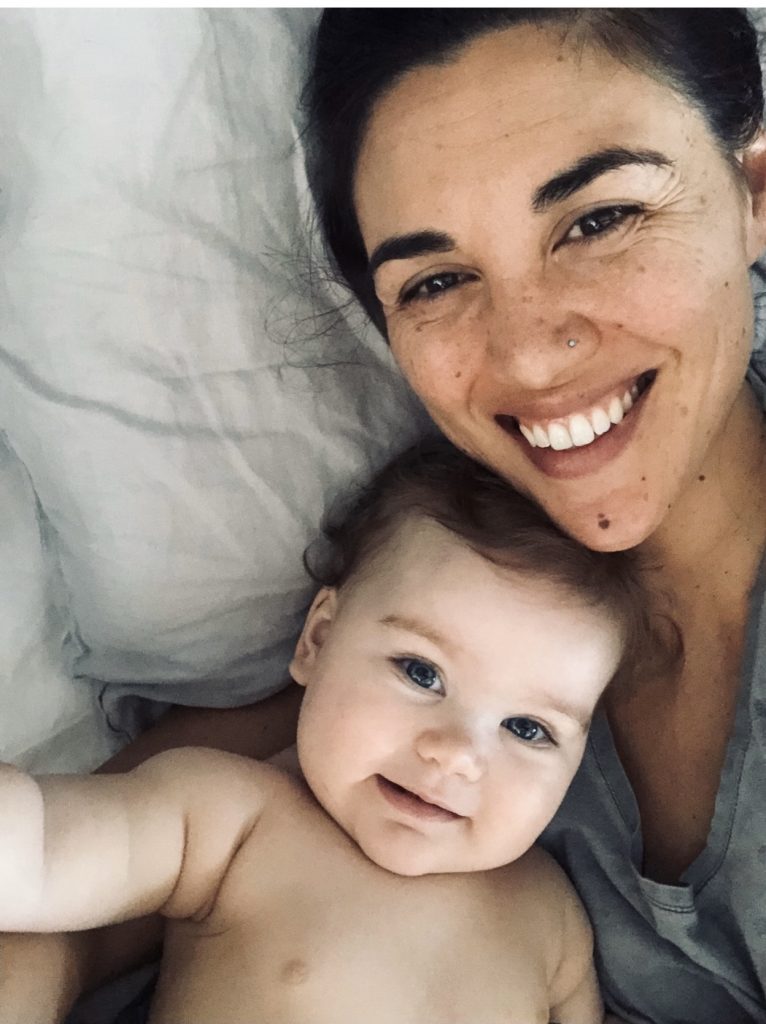Your Baby Sleeping Through the Night and Intuitive Parenting: When the Mainstream Formula Doesn't Work
by Steph Sanders
“It is when a mother trusts her judgment that she is at her best.”
(I would add that when parents and caregivers trust their judgment, the family unit is at its best.)
– Donald Winnicott

My daughter Sam – You expect me to sleep in a crib and through the night at six months?!
Sorry mom, not for me!
I didn’t give much thought to baby sleep before having my daughter. I couldn’t have imagined what our journey to “sleeping through the night” would be. But there are things I didn’t expect I would do as a mother.
How I experienced these things went against certain “truths” of how babies “should” sleep according to the mainstream narrative.
A few mainstream sleep narratives that conflicted with my personal experience:
- Babies should sleep in their crib after six months of age and in their own room sooner than later.
- The king of all sleep milestones – your baby sleeping through the night. In a race to achieve this as quickly as possible, there can be an over-emphasis on the parents’ role with less attention to the baby’s natural temperament and needs.
- Another milestone to reach as quickly as possible is self-soothing, so a baby doesn’t need a caregiver to get or return to sleep.
- Put your baby down “drowsy but awake.”
- Sleep associations, like rocking, holding, and nursing to sleep, to help your baby to sleep leads to sleep crutches. These will hinder your baby’s ability to self-soothe.
I don’t think that the path to better baby sleep listed above is the wrong way. It just wasn’t our way. The guidelines above didn’t work for us.
Our Rough Patches

Finding our way with tired eyes and cozy moments.
For some insight, my daughter, Sam, never took to sleeping in a bassinet or crib, and we quickly began co-sleeping. We gave away her crib when she was around seven months.
I researched safe co-sleeping, and it was something my husband and I felt comfortable with. It also felt natural to us.
We have experienced our fair share of rough patches. We (more me than my husband) have wondered if what we are doing is wrong or if it would be easier to sleep train. I have questioned our choices.
But in accepting that sleep trials and tribulations are part of the gig and knowing that it will pass, we came back to what felt true to us and this helped us stay the course.
My daughter is now almost 20 months and we still co-sleep. Several months ago, my daughter and I started sleeping in the guest bedroom, as we found everyone slept better. This is another thing I never thought I would do.
This change didn’t affect our relationship dynamics or intimacy (another worthwhile topic to explore). Simply put, it works for us, for now. I return to this question all the time. If something is working, why should we fight to change it?
Researching Another Way
When my experience differed from what I saw being recommended, I started to search for resources and communities that I could relate to because I knew I couldn’t be alone (the beauty of the internet)! I also began questioning common sleep recommendations, especially when they felt so out of alignment with our daughter and family.
After discovering other narratives that better matched how I wished to support Sam in her sleep, I solidified and felt more confident with our approach. I can now return to my sleep philosophy when Sam has another sleep re/progression or amidst transition.
Some alternative sleep notions that resonated more with me
- There is a rush to get babies to be independent in their sleep and with much understanding. Everyone is tired and needs rest. Who wants to hear it could take years for a baby/toddler to sleep independently without your help? One small shift I reminded myself was maybe I could get through challenging periods with less sleep if I’m able to REST more (30-minutes to myself to lie down and close my eyes, a short meditation, or uninterrupted phone call with a friend).
- Normalizing that babies wake up at night. Reading comments in online groups and speaking to friends, babies waking up throughout the night is beyond common and natural. Some babies begin sleeping through the night much earlier than others, and I’m guessing if you’re reading this, you’re part of the latter.
- Using rocking, holding, nursing to sleep as a way to get your baby to sleep is natural, and they will get to sleep on their own at some point. There are ways to gently change these habits if it’s something you are ready for.
- Self-soothing, another milestone, which can be helped along, comes in its own time for each baby. It’s developmental.
Sleeping Through the Night
After finding Heidi and Baby Sleep Advice online, and a few other resources, it eased my worries that I was doing something wrong, that I’d be breastfeeding my daughter to sleep forever, or that our choices were going to hinder her ability to sleep on her own.
I’m happy to report that we gradually night weaned, because it felt like the right time for us, and Sam has started sleeping through the night. I expect future periods of growth and adjustment but we are letting ourselves celebrate this period of more sleep.
Sleep Acceptance and Turning to Yourself for Answers
When we look at the variables of when a baby walks, talks, stops breastfeeding/taking a bottle, each is determined by their unique situation, personality, and home environment.
In most cases, we wouldn’t stress about our baby starting to walk, but then again, this doesn’t hinder our ability to get sleep. While it’s helpful to know a general timeline of milestones, there is freedom in giving space and personal agency to what feels suitable for your family.
Intuitive parenting is being able to nurture and listen to the voice within that knows what is best for our baby. This voice can be muted or forgotten when what we feel is best doesn’t align with what friends, family, or popular opinions deem as best. Finding a supportive community can help strengthen that voice.
Before Making a Change, Ask Yourself…
- Are you making a change because you think you should?
- Is what you’re currently doing working for you and your family? If yes, stay with it until that’s not the case anymore.
- If it’s not working for you, your family, your baby, or all the above, then let yourself change it. This may be a slow and gradual change or quicker depending on your baby. Trust yourself and the way of parenting that feels natural for you. Find help or support when needed.
This article isn’t to say how you should parent but highlight the many ways to get to the same place. Perhaps some of what I share resonates or offers a glimmer of hope during a challenging period.
I hope it opens up a conversation about acceptance for ourselves, our situation, and the way we choose to parent while giving space for others who do it differently. We don’t have to judge others’ choices on our way to realizing our unique path. What if we put more emphasis on the loving care and intention behind a behavior (how your baby gets to sleep, for example) instead of the behavior itself?
If you want to support your baby’s sleep without formal sleep training or “cry it out”, you are in good company! We are here to help and support you. Do you want insight into gentle self-soothing methods? You can read this article written by Heidi, and begin applying some helpful steps today!
💛 Comments? Questions? Join the friendly, supportive discussion on Rested! our beloved private community platform, free to join.

Baby waking every hour?
by Heidi Holvoet, PhD

A Bedtime Routine: Settling To Sleep Like A Charm
by Heidi Holvoet, PhD

Separation Anxiety
by Heidi Holvoet, PhD

Colic
by Heidi Holvoet, PhD

Why does my baby wake up every hour?
by Heidi Holvoet, PhD


